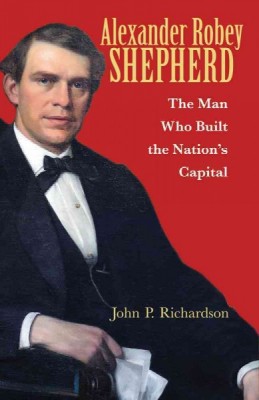| Alexander Robey Shepherd: The Man Who Built the Nation's Capital Contributor(s): Williams, Tony (Foreword by), Richardson, John P. (Author) |
|
 |
ISBN: 0821422502 ISBN-13: 9780821422502 Publisher: Ohio University Press OUR PRICE: $28.45 Product Type: Paperback - Other Formats Published: October 2016 |
| Additional Information |
| BISAC Categories: - Biography & Autobiography | Political - History | United States - 19th Century - History | United States - State & Local - Middle Atlantic (dc, De, Md, Nj, Ny, Pa) |
| Dewey: B |
| LCCN: 2016024887 |
| Physical Information: 0.9" H x 6.1" W x 9.1" (1.10 lbs) 288 pages |
| Themes: - Demographic Orientation - Urban - Locality - Washington, D.C. - Geographic Orientation - District of Columbia - Chronological Period - 1851-1899 |
| Descriptions, Reviews, Etc. |
| Publisher Description: With Alexander Robey Shepherd, John P. Richardson gives us the first full-length biography of his subject, who as Washington, D.C.'s, public works czar (1871-74) built the infrastructure of the nation's capital in a few frenetic years after the Civil War. The story of Shepherd is also the story of his hometown after that cataclysm, which left the city with churned-up streets, stripped of its trees, and exhausted. An intrepid businessman, Shepherd became president of Washington's lower house of delegates at twenty-seven. Garrulous and politically astute, he used every lever to persuade Congress to realize Peter L'Enfant's vision for the capital. His tenure produced paved and graded streets, sewer systems, trees, and gaslights, and transformed the fetid Washington Canal into one of the city's most stately avenues. After bankrupting the city, a chastened Shepherd left in 1880 to develop silver mines in western Mexico, where he lived out his remaining twenty-two years. In Washington, Shepherd worked at the confluence of race, party, region, and urban development, in a microcosm of the United States. Determined to succeed at all costs, he helped force Congress to accept its responsibility for maintenance of its stepchild, the nation's capital city. |